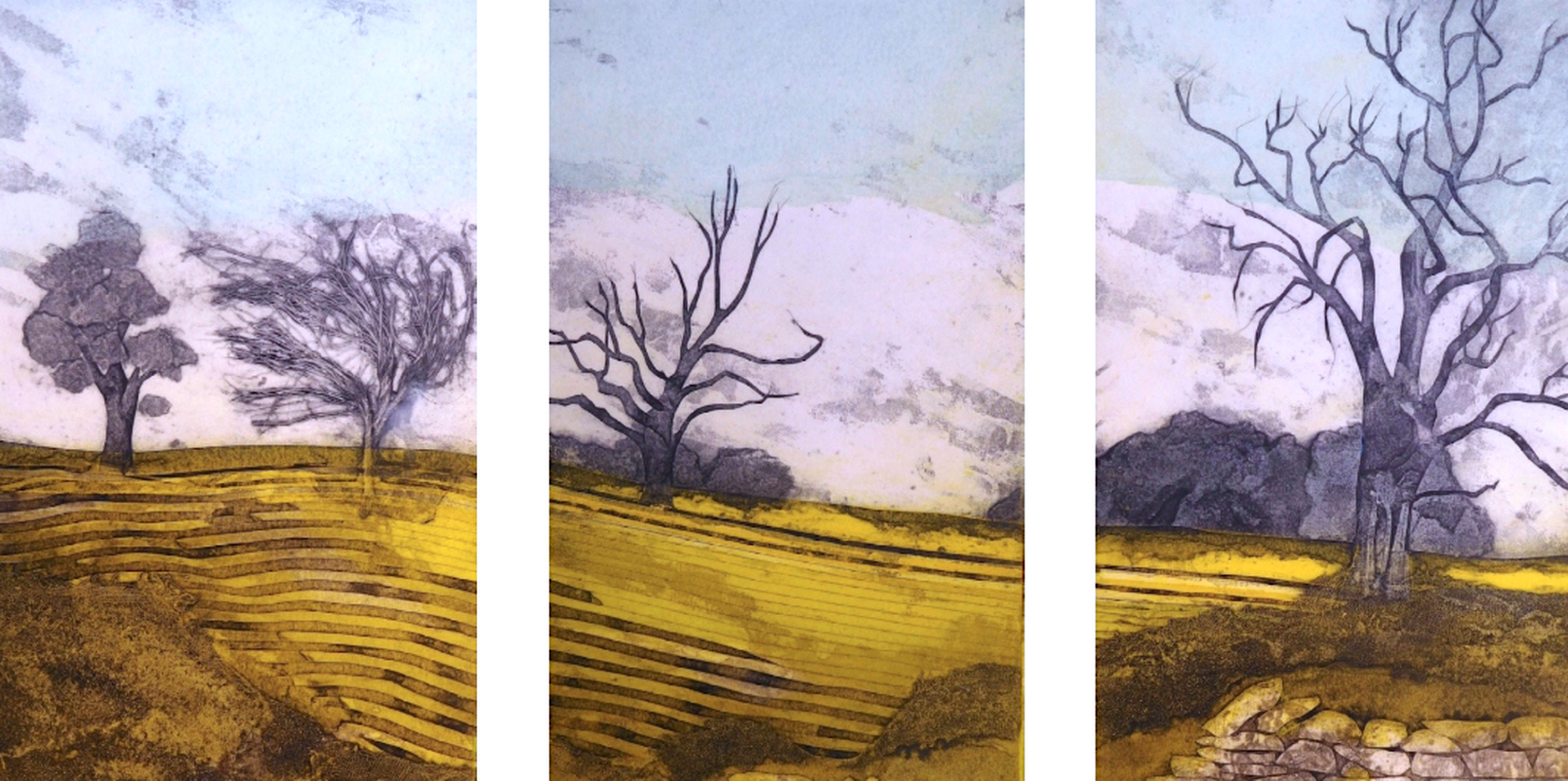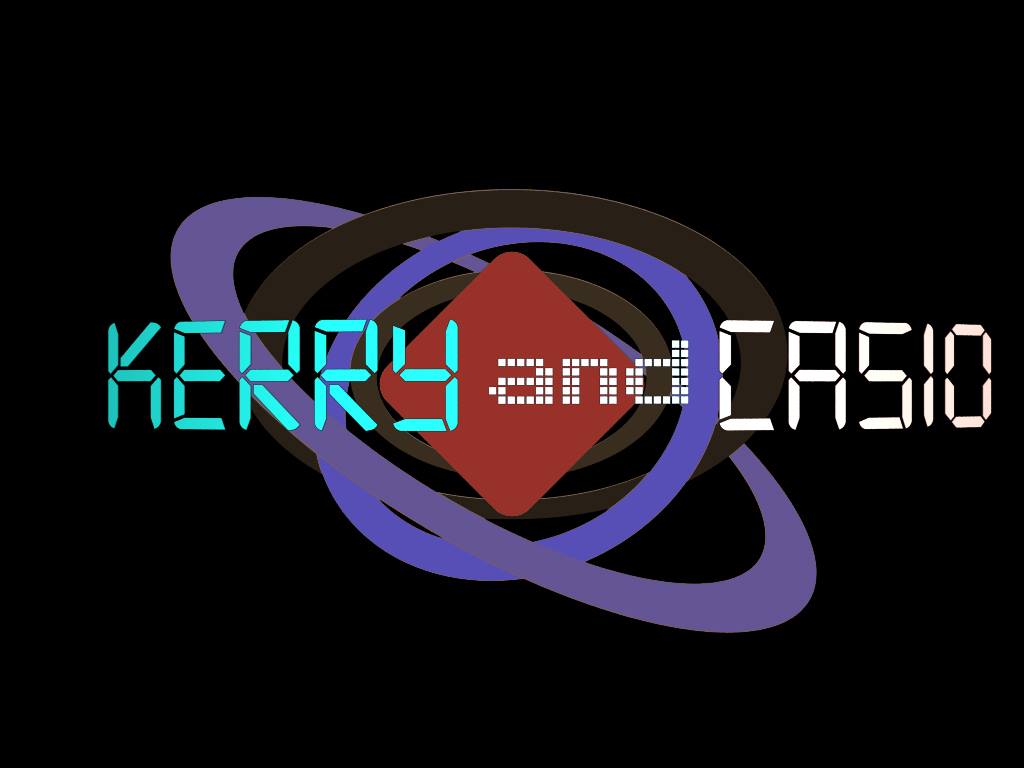
SARAH ROSS-THOMPSON AND THE ART OF COLLAGRAPHED PRINTS
I interviewed artist Sarah Ross-Thompson whose exceptional Collagraphed prints use fabrics, lichen, porridge and string to create images of the dramatic Scottish Highlands where she


I interviewed poet and musician Kerry Priest about her innovative poetry collection The Bone Staircase and her experimental work at Guildhall School of Music & Drama. Kerry descibes The Bone Staircase as “…a metaphor for the double helix of your DNA. I’d been looking for a way to write about prehistory, mostly because I love caves and stone circles and that sort of thing. I was having IVF and suddenly felt an overwhelming connection to the idea of ancestry, my family tree and the deep time of evolution.”
Leslie: Could you give us an overview, please, of the music you compose and perform. How does it contrast with (or compliment) the poetry you write? How do the two relate to your scripts and radio work?
Kerry: In 2016, I almost died. I had two collapsed lungs and then pneumonia. Since that point, most of my audio work became focused on the vocal tract, whether through sound poetry, beatboxing, or extended voice techniques. I became fascinated with the voice and how I might change it electronically.
In the summers of 2018 and 2019, I studied with Alice Oswald and Stevie Wishart at Dartington on their combined course which mixed early music and polyphony with poetry. I then added polyphony to the electronic manipulation.
One use for these polyphonic soundscapes has been radio drama, and so it was through producing radio dramas and then polyphonic stage plays that I eventually realised I was probably naively skirting around opera and so decided to learn about opera.
Leslie: How do you begin, grow and develop your musical and your poetic ideas, please? What’s different about the two disciplines?
Kerry: I tend to make a distinction between what I call “top-down” thinking, where I impose pre-determined structures on a creation, and “bottom-up” thinking, where I open myself up to the ether and try to create spontaneously. Poems tend to begin with a bottom-up process, such as walking in nature, listening to conversations or daydreaming. I have a notebook with me at all times. At some point, I go over the notes and look for ideas and phrases that are worth keeping and think how they relate to the big issues I am thinking about in my life, such as womanhood, class, environmentalism, the state/anarchism, the death of my parents, the birth of my child, the need for joy and wonderment and so on.

It is at the point where two ideas intersect that the spark of a poem is born. For example, I’ve been wanting to write about my time as a DJ for many years, but could not find a way in. Hedonism is a fairly uninteresting topic for poetry. After about six years of writing about a particular woodland patch in my garden, I eventually infused my DJing stories with the texture of forests. I moved the action to free parties in the woods and brought in Robin Hood vibes. This is now on the way to becoming a verse novel about the counterculture and its relationship with the land.
I did recently put together a set of “top-down” poems which were metaphysical poems inspired by the ideas of my husband Stephen. They went into a Philosophy Festschrift alongside lots of articles about being and consciousness and that sort of thing. This way of working is more akin to how I would normally approach a piece of music. I’ll often have a pre-determined idea of the genre, technology required, length of track and overall feel I want to achieve.
In my work as a librettist, I’ve been collaborating with composers who often already have a predetermined structure for the work in mind. My job is then to find ways of writing verse to fit the structure. It’s quite a top-down approach, but luckily I can draw on reams of notes from my poetry notebooks.
Leslie: What circumstances help and hinder creative work for you?
Kerry: Process is becoming ever more important to me. I am constantly devising ways of making. As time restraints become more severe, not least since the birth of my child, process becomes really important.
For example, when Astrid was really little, I often only had a 20-minute slot each day to take a breather on my own. So I made a little ritual of visiting the same spot in the garden and doing a little grounding meditation and then opening up to nature and free writing. By combining walking, meditating, stretching and free writing, I was able to make some unusual, powerful work. In fact, nearly all the poems I wrote during this time have been published. It really hit a rich seam.
In some ways, I was rediscovering what Keats called Negative Capability, where you spend time with an object in nature and tap into its consciousness. I suppose this is close to what Charles Olson meant when he said that poetry is energy transferreed.
Leslie: How do any of the following figure in your work and relate to your life – Dartmoor, Paganism, feminism and Green issues? Can you describe the process of adapting personal life experiences into expressive artworks?
Kerry: I suppose my poetic process is itself a form of environmentalism. Deep listening and responding to nature by trying to take your own thoughts out of the equation would be good for the planet if we all did it more often. But I tend to avoid overtly political poetry. It’s just too easy to slip into truisms and platitudes. Rekindling a sense of joy and wonder in the natural world, or even finding solace in grief through observing the viciousness of nature are more my cup of tea.
 It is moving to Dartmoor and meeting various ‘wild women of the high moors’ that really got me into writing poetry in the first place. Many of the poets around here are healers or witches. But I shy away from being too overt with it in my own writing, for some reason.
It is moving to Dartmoor and meeting various ‘wild women of the high moors’ that really got me into writing poetry in the first place. Many of the poets around here are healers or witches. But I shy away from being too overt with it in my own writing, for some reason.
In some ways, my work is trying to translate nature-based ‘woo’ into something more palatable to the general reader. I suppose The Bone Staircase is a case in point, as it’s a book about modern day IVF but with ancestor worship and prehistory peeping through the cracks.
Leslie: How do you work on/approach a performance? Can you describe ‘lightbulb moments’ when previous performances and improvisations have led to new expressive ideas? Or do you develop your new ideas much slower and through painstaking revision/study?
Kerry: A couple of years ago, I was in a band called Tin Moth and we were looking for somewhere to practise and Rhod said, “Why don’t we practise live on air on Soundart Radio?” I had never done the whole free jazz improv thing before, but a weekly two-hour show for a year certainly gave me some experience in it.
We ended up sort of scouring everywhere for ways into making music. We collected pine cones and amped them up, we circuit-bent old car boot sale toys, we followed videos of the sea coming in and out, we made up lyrics based on opening books at random. I had a whole weaving and knitting phase.
On the other hand, I’m pretty fastidious when it comes to editing poetry. Some poems have had dozens of revisions over several years.
Leslie: What sits behind your powerful, multi-disciplinary creative drive? Where does it come from?
Kerry: When Astrid was born, I saw that poetry was a more fundamental form of speaking than prose. She played with gestures and grunts and rhythm and rhyme way before proper speech came out; pure expressions of emotion. Pure poetry.
We are all born creative and the key to retaining it is to devise ways of bypassing the inner critic. If you want other people to enjoy it and understand it, you do have to grudgingly invite the critic back sometimes, but then create spaces in your life to allow your mind to wander off later.
I’m lucky in that the big draw for poetry for me is not self-expression. Most poets get lost in trying to exorcise demons or bring down the government. I am more interested in words and craft, spying on other people and participating in deep ecology.
I like the idea of being part of a bardic tradition going back into prehistory, but I also love electronic music and novelty for novelty’s sake. There’s something about appreciating the now and your place in time/ the universe behind it all, I suppose.
Next week, I interview Eva Melissa Roshan whose book, ‘Wearing Red-One Woman’s Journey to Sanity’, describes how she overcame childhood sexual abuse, alcohol & debt addiction, divorce, depression and self-abuse.
ABOUT LESLIE TATE’S BOOKS:

I interviewed artist Sarah Ross-Thompson whose exceptional Collagraphed prints use fabrics, lichen, porridge and string to create images of the dramatic Scottish Highlands where she

Part 2 of my interview with Mark Statman looks closely at Mark’s Latin American poetic influences, his life in Mexico and ends with an extract

I interviewed international poet and translator Mark Statman about Volverse/Volver, his 14th published collection. Mark, who has won national arts awards, is Emeritus Professor of Literary

I interviewed Lisa Dart, finalist in the Grolier, Aesthetica and Troubadour Poetry Prizes and author of The Linguistics of Light (poems, Salt, 2008), Fathom (prose

I interviewed writer Julia Lee Barclay-Morton about her experience of autism. Julia began as an experimental dramatist in New York, moving to the UK to
| Cookie | Duration | Description |
|---|---|---|
| cookielawinfo-checkbox-analytics | 11 months | This cookie is set by GDPR Cookie Consent plugin. The cookie is used to store the user consent for the cookies in the category "Analytics". |
| cookielawinfo-checkbox-functional | 11 months | The cookie is set by GDPR cookie consent to record the user consent for the cookies in the category "Functional". |
| cookielawinfo-checkbox-necessary | 11 months | This cookie is set by GDPR Cookie Consent plugin. The cookies is used to store the user consent for the cookies in the category "Necessary". |
| cookielawinfo-checkbox-others | 11 months | This cookie is set by GDPR Cookie Consent plugin. The cookie is used to store the user consent for the cookies in the category "Other. |
| cookielawinfo-checkbox-performance | 11 months | This cookie is set by GDPR Cookie Consent plugin. The cookie is used to store the user consent for the cookies in the category "Performance". |
| viewed_cookie_policy | 11 months | The cookie is set by the GDPR Cookie Consent plugin and is used to store whether or not user has consented to the use of cookies. It does not store any personal data. |
One Response
Hi Leslie, thank you for sharing about Kerry and her poetry. Her processes for writing and creating are very intriguing.